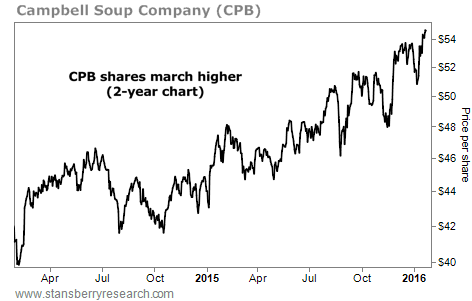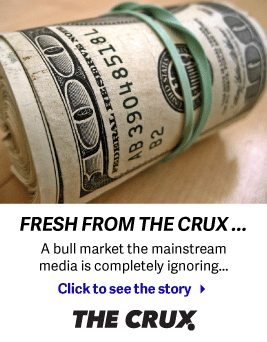| Home | About Us | Resources | Archive | Free Reports | Market Window |
|
Editor's note: Today, we're sharing a great essay from our friend Alexander Green, a best-selling author who has extremely valuable investing ideas. Below, he explains a simple plan to succeed in today's volatile market...
Is It Time for Investors to Panic?By
Wednesday, January 27, 2016
Talk about an inauspicious start...
The market stumbled out of the gate this year like a drunk leaving his favorite saloon at closing time. Virtually every sector is down. So are most overseas markets.
Many market pundits now claim this is it, the beginning of the long-awaited bear market. Is it time to panic?
Of course not.
Panicking is for when a toddler in your charge suddenly darts into the street. It has no place in portfolio management.
Let's do a reality check here.
Trees don't grow to the sky and stocks don't rally in perpetuity. History shows that every bull market is followed by a bear market.
And that's OK, because every bear market is followed by another bull market. The market's long-term trend is higher highs and higher lows.
As for all those confident market prognosticators, recall what Peter Lynch, the legendary manager of the Fidelity Magellan Fund, wrote in his investment classic One Up on Wall Street:
Almost without exception, the folks proclaiming the end is nigh have a long history of making similar predictions. And all they have to show for it – aside from a complete inability to feel embarrassment – is the yolk running down their faces. As Vanguard founder John Bogle often notes, there are two types of market timers: Those who don't know what they're doing and those who don't know they don't know what they're doing.
Remember that the next time you hear some CNBC contributor confidently pronouncing what the market is likely to do next.
Given the uncertainty inherent in financial markets, what does a sophisticated investor do?
Take a long-term investor, for example. He knows that bull and bear markets are a fact of life. So he sets an asset allocation and sticks with it. That means every year he sells down the assets that have appreciated the most and adds to those that lagged the most. (Again, I'm referring to asset classes – equities, bonds, real estate investment trusts, Treasury inflation-protected securities, etc. – not individual stocks. You most definitely should NOT add to the worst stocks in your portfolio.)
Rebalancing doesn't just reduce portfolio volatility. It forces you to sell what's high and buy what's low. That gooses annual returns.
A short-term trader, on the other hand, uses a different sell discipline. He uses trailing stops. Trailing stops protect your profits in the good times and your principal in the bad.
However, you must actually implement them rather than simply imagining you will. Some investors so detest taking small, short-term losses that they end up with big, long-term losses instead.
Not good.
Occasional losses are a fact of life. That means you must be capable of acting resolutely and unemotionally. If you can't do this, you may need to turn your portfolio management over to a trustworthy, low-cost investment pro. (As the old saying goes, "A man's got to know his limitations.")
Understand that I'm not suggesting you shouldn't feel emotional occasionally. That's too much to ask of flesh-and-blood human beings when financial markets come unbound from time to time, as they will.
But you can't act on those emotions and expect to prosper.
It may seem simplistic to some that you need only have a workable plan, respond unemotionally, and stick with your discipline.
But history demonstrates that the key to long-term investment success is not doing something absolutely brilliant. It's not doing something terribly foolish.
Good investing,
Alexander Green
Further Reading:
On Friday, Porter Stansberry told readers about an investment strategy that's so simple and effective, he calls it the "magic portfolio." This idea combines buying the highest-quality businesses with extremely stable stocks. When used to build whole portfolios, this combination produces market-beating results with about half the volatility of the stock market as a whole. Learn more about this strategy right here.
Dr. David "Doc" Eifrig recently explained how today's volatile market is presenting us with a great opportunity to "get in while the getting's good." You can learn about his strategy in this essay from last week.
Market NotesCAMPBELL SOUP CONTINUES ITS UPTREND Today's chart shows that one of our core investment themes is working again, even during these volatile times.
The idea is to own capital-efficient businesses – particularly ones that dominate their market. These companies have long-lived products and strong customer loyalty. They operate consistent, global businesses. And they will continue to pay their dividends and make share buybacks whether the euro disintegrates, whether the U.S. dollar is devalued, etc.
One example of these elite stocks is Campbell Soup Company (CPB). This $17 billion food producer has been a staple of consistency over the years, and continues to outperform today. Campbell's sells more than 60% of the world's packaged soup, making it incredibly difficult to compete with. As Extreme Value editor Dan Ferris says, there's no substitute for being No. 1.
As you can see from the chart below, being a capital-efficient industry leader works. CPB shares are up 30% over the past two years. More important, the stock continues to perform well despite the recent market selloff, recently hitting a new 52-week high. It's a winning formula for safe, reliable returns.
 |
Recent Articles
|



